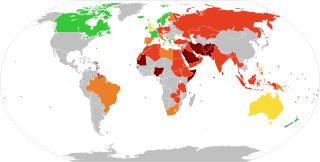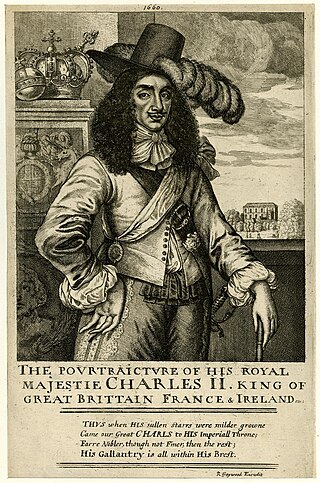
The Stuart Restoration was the reinstatement in May 1660 of the Stuart monarchy in England, Scotland, and Ireland. It replaced the Commonwealth of England, established in January 1649 after the execution of Charles I, with his son Charles II.
Blasphemy refers to an insult that shows contempt, disrespect or lack of reverence concerning a deity, an object considered sacred, or something considered inviolable. Some religions, especially Abrahamic ones, regard blasphemy as a crime, including insulting the Islamic prophet Muhammad in Islam, speaking the sacred name in Judaism, and blasphemy of God's Holy Spirit is an eternal sin in Christianity. It was also a crime under English common law, and it is still a crime under Italian law.
The Test Acts were a series of penal laws originating in Restoration England, passed by the Parliament of England, that served as a religious test for public office and imposed various civil disabilities on Catholics and nonconformist Protestants.
The Witchcraft Acts were a historical succession of governing laws in England, Scotland, Wales, Ireland, and the British colonies on penalties for the practice, or—in later years—rather for pretending to practice witchcraft.
Laws prohibiting blasphemy and blasphemous libel in the United Kingdom date back to the medieval times as common law and in some special cases as enacted legislation. The common law offences of blasphemy and blasphemous libel were formally abolished in England and Wales in 2008 and Scotland in 2024. Equivalent laws remain in Northern Ireland.
Thomas Aikenhead was a Scottish student from Edinburgh, who was prosecuted and executed at the age of 20, on a charge of blasphemy under the Act against Blasphemy 1661 and Act against Blasphemy 1695. He was the last person in Great Britain to be executed for blasphemy. His execution occurred 85 years after the death of Edward Wightman (1612), the last person to be burned at the stake for heresy in England.
Patriot Parliament is the name commonly used for the Irish Parliament session called by King James II during the Williamite War in Ireland which lasted from 1688 to 1691. The first since 1666, it held only one session, which lasted from 7 May 1689 to 20 July 1689. Irish nationalist historian Sir Charles Gavan Duffy first used the term Patriot Parliament in 1893.
Events from the year 1707 in Great Britain, created on 1 May this year as a consequence of the 1706 Treaty of Union and its ratification by the 1707 Acts of Union.
Events from the year 1736 in Great Britain.

The Blasphemy Act 1697 was an Act of the Parliament of England. It made it an offence for any person, educated in or having made profession of the Christian religion, by writing, preaching, teaching or advised speaking, to deny the Holy Trinity, to claim there is more than one god, to deny the truth of Christianity and to deny the Bible as divine authority.

A blasphemy law is a law prohibiting blasphemy, which is the act of insulting or showing contempt or lack of reverence to a deity, or sacred objects, or toward something considered sacred or inviolable. According to Pew Research Center, about a quarter of the world's countries and territories (26%) had anti-blasphemy laws or policies as of 2014.

The act 53 Geo. 3. c. 160, sometimes called the Doctrine of the Trinity Act 1813, the Trinitarian Act 1812, the Unitarian Relief Act, the Trinity Act, the Unitarian Toleration Bill, or Mr William Smith's Bill, was an act of the Parliament of the United Kingdom which amended its blasphemy laws and granted toleration for Unitarian worship.
In Ireland, "publication or utterance of blasphemous matter", defamatory of any religion, was a criminal offence until 17 January 2020. It was a requirement of the 1937 Constitution until removed after a 2018 referendum. The common law offence of blasphemous libel, applicable only to Christianity and last prosecuted in 1855, was believed to fulfil the constitutional requirement until a 1999 ruling that it was incompatible with the constitution's guarantee of religious equality. The Defamation Act 2009 included a provision intended to fill the lacuna while being "virtually impossible" to enforce, and no prosecution was made under it. The 2009 statute increased controversy, with proponents of freedom of speech and freedom of religion arguing for amending the constitution. After the 2018 constitutional amendment, a separate bill to repeal the 2009 provision and residual references to blasphemy was enacted in 2019 by the Oireachtas (parliament) and came into force in 2020. The Prohibition of Incitement to Hatred Act 1989, which includes religion among the characteristics protected from incitement to hatred, remains in force.

The Restoration of the Monarchy of Ireland began in 1660. The Commonwealth of England, Scotland and Ireland (1649–1660) resulted from the Wars of the Three Kingdoms but collapsed in 1659. Politicians such as General Monck tried to ensure a peaceful transition of government from the "Commonwealth" republic back to monarchy. From 1 May 1660 the English, Scottish and Irish monarchies were all restored under King Charles II. The term Restoration may apply both to the actual event by which the monarchy was restored, and to the period immediately before and after the event.

The Restoration was the return of the monarchy to Scotland in 1660 after the period of the Commonwealth, and the subsequent three decades of Scottish history until the Revolution and Convention of Estates of 1689. It was part of a wider Restoration in the British Isles that included the return of the Stuart dynasty to the thrones of England and Ireland in the person of Charles II.

The Rescissory Act 1661 or Act rescinding and annulling the pretended parliaments in the years 1640, 1641 etc. was added to the Scottish Parliamentary register on the 28 March 1661. At one stroke, it annulled the legislation of 1640–1648, covering the time of the Wars of the Three Kingdoms and the Commonwealth. This parliament was sometimes known disparagingly as the "Drunken Parliament".

Sir James Murray, Lord Philiphaugh PC was a Scottish judge and politician who twice served as Lord Clerk Register from November 1702 to June 1704 and from April 1705 to July 1708, when he died in office. Serving as a political advisor to the prominent statesman James Douglas, 2nd Duke of Queensberry, Murray assisted him in passing the 1707 Union with England Act through a divided Parliament of Scotland.

The Blasphemy Act 1661 was an act of the Parliament of Scotland.
Events from the 1660s in the Kingdom of Scotland.








